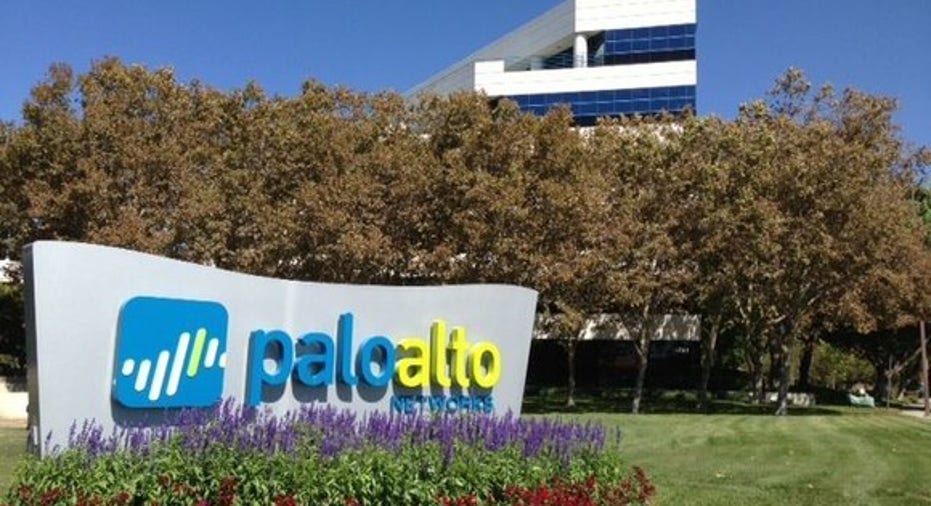Palo Alto Networks, Inc. Goes 9-for-9

IMAGE SOURCE: PALO ALTO NETWORKS.
Palo Alto Networks(NYSE: PANW)reported fiscal fourth-quarter 2016 results Tuesday after the market close, marking itsninthconsecutive quarterly beat and announcing a significant new share repurchase program in the process. But shares fell nonetheless in after-hours trading, as Palo Alto's conservative guidance once again overshadowed a solid quarter.
But before we get there, let's take a deeper look at how the next-gen security company closed its latest fiscal year.
Palo Alto Networks results: The raw numbers
| Metric |
Fiscal Q4 2016 Actuals |
Fiscal Q4 2015 Actuals |
Growth (YOY) |
|---|---|---|---|
|
Revenue |
$400.8 million |
$2089.3 million |
41.2% |
|
Adjusted net income |
$46.2 million |
$25.0 million |
84.8% |
|
Adjusted EPS |
$0.50 |
$0.28 |
78.6% |
DATA SOURCE: PALO ALTO NETWORKS. YOY = year over year.
What happened with Palo Alto Networks this quarter?
- Revenue was well above Palo Alto's guidance, which called for a range of $386 to $390 million, and adjusted earnings per share arrived at the high end of its outlook of $0.48 to $0.50.
- Revenue growth included a 24% year-over-year increase in product sales, to $191.1 million, and 61.6% growth in services sales, to $209.7 million.
- Billings increased 45.4% year over year, to $572.4 million.
- Palo Alto Networks remains unprofitable based on generally accepted accounting principles (GAAP), delivering a GAAP net loss of $54.5 million, or $0.61 per share, compared to a GAAP net loss of $46 million, or $0.55 per share in last year's fiscal fourth quarter. As usual, however, this is no surprise as Palo Alto Networks consciously pursues top-line growth and taking market share at the expense of bottom-line GAAP profitability.
- Generated quarterly cash flow from operations of $187.5 million, and free cash flow of $171.2 million.
- Formed a partnership with Accenture, Splunk, and Tanium to develop an integrated security offering that includes Palo Alto's next-gen security platform.
- Released Traps version 3.4, an advanced endpoint protection platform (and more effective alternative to traditional antivirus software), strengthening its malware and exploiting prevention capabilities.
- Established the new WildFire EU cloud focused on data privacy, protection, and localization concerns for European organizations.
- On Aug. 26, 2016, Palo Alto's board authorized a $500 million share repurchase authorization, which expires on Aug. 31, 2018.
- Ended the fiscal year with roughly $1.9 billion in cash, cash equivalents, and investments.
What management had to say
As Palo Alto CEO Mark McLaughlin said:
Looking forward
For the (current) fiscal first-quarter 2017, Palo Alto expects revenue of $396 million to $402 million, or growth of 33% to 35% over the same year-ago period. That should result in adjusted earnings per diluted share in the range of $0.51 to $0.53, up from adjusted EPS of $0.35 per share in fiscal Q1 of 2016. For perspective, and though we don't pay close attention to Wall Street's quarterly demands, analysts' consensus estimates called for Palo Alto to deliver fiscal Q1 2017 revenue near the high end of its guidance range, and adjusted earnings of $0.56 per share.
Here again, I'm left with a case of deja vufrom last quarter, when Palo Alto Networks similarly turned in a stronger-than-expected performance, only to offer lighter-than-expected guidance to the chagrin of our fickle market.In the end, while the market's reaction to this report may not indicate as much, I think patient, long-term investors should still be pleased with where Palo Alto Networks stands today.
A secret billion-dollar stock opportunity The world's biggest tech company forgot to show you something, but a few Wall Street analysts and the Fool didn't miss a beat: There's a small company that's powering their brand-new gadgets and the coming revolution in technology. And we think its stock price has nearly unlimited room to run for early in-the-know investors! To be one of them, just click here.
Steve Symington has no position in any stocks mentioned. The Motley Fool owns shares of and recommends Splunk. The Motley Fool recommends Accenture and Palo Alto Networks. Try any of our Foolish newsletter services free for 30 days. We Fools may not all hold the same opinions, but we all believe that considering a diverse range of insights makes us better investors. The Motley Fool has a disclosure policy.



















